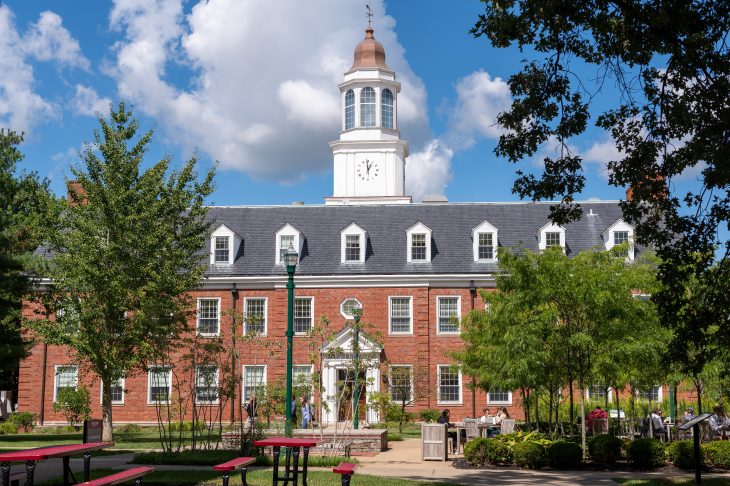
Founded in 1780 as the first university in Kentucky, generations of Transylvania students have been educated in — and have deeply benefited from — the university’s commitment to the liberal arts, learning how to read, write and think critically in ways that prepare them to be responsible citizens.
A liberal arts education gives students a broad base of knowledge in multiple disciplines — without shortchanging the focused study required in their selected majors. Business majors take art courses in addition to accounting and economics; English majors are comfortable solving quadratic equations as well as writing solid thesis statements. Students who are interested in creative expression through the arts or communicating effectively in another language have the opportunity to hone those skills through individual majors, as well as a wide range of interdisciplinary course offerings, culminating in a well-rounded education.
This exposure to a wide range of fields results in well-educated and, ultimately, highly employable graduates. In a constantly shifting job market, liberal arts students are able to think independently and pivot quickly rather than being tied to a specific set of skills that are no longer valuable.
“We are keenly aware that we have to prepare our students for ‘The Conceptual Age,’ developing their critical thinking, communication and creative skills that can’t be outsourced, automated or replaced by artificial intelligence,” noted Transylvania President Brien Lewis. “Our commitment to excellence in liberal arts education is unwavering, as we know that it prepares students to continually adapt in a complex world.”
‘Theater for All’: An inclusive space to create and collaborate
Transylvania’s fine arts departments, including theater, studio art and music performance, welcome students from multiple majors to participate in their robust programs. “We truly embody a liberal arts environment,” said Tosha Fowler, director of the theater program. “Engaging in theater makes us all better humans. Not just intellectually, but rather holistically, as we engage with our physical bodies with open hearts.”
Per the department’s mission statement, Transylvania’s theater program provides a “Theater for All” space, creating valuable experiences specific to both the major and nonmajor. The program is committed to cultivating an environment that supports the ability of students to imagine, empathize, collaborate and create, aligning itself to the university’s broader liberal arts mission.
Citing communication, the ability to problem-solve, creative thinking, project management, storytelling, collaboration and empathy as some of the many valuable skills developed by theater students, Fowler added that “employers love to see these transferable skills on entry-level resumes,” as do graduate and professional schools.
Transylvania recently revamped its theater curriculum, with plans to expand the major by creating new pathways. Pending approval, the department will offer not just a traditional theater arts major, but also majors in theater performance, as well as theater design and technology, offering new routes of specialization for students to pursue.
Communicating effectively across cultures
Another mainstay of a liberal arts education, Transy’s foreign language programs give students the opportunity to expand their horizons and increase their cultural competency. With available majors in French, German and Spanish, as well as a minor in Chinese, students are able to add a second language to their portfolio, making them competitive candidates in a global job market. Jeremy Paden, Spanish professor and chair of the humanities division at Transylvania, noted that bilingual employees often “are higher-paid and are afforded travel opportunities” in comparison to their monolingual peers, adding that “a foreign language opens doors for students.”
Not only can these students consider working internationally, but they might even be more appealing as prospective Fulbright candidates — recent awardees of the prestigious grant have been language majors.
Paden referred to language study as “a bridge across cultures,” adding that “the study of a foreign language improves memory, eloquence in one’s own language and has positive effects on other areas of study. It is not just a way to encounter difference, but maybe, even, a way to begin to think differently.”
Transylvania senior Sophie Ritzenthaler can attest to the value of studying a second language. The international affairs and Spanish double-major had dreamed of studying abroad in Spain since she was in sixth grade — in fact, she chose to attend Transy based in large part on the university’s academic rigor and robust study abroad program.
She was able to fulfill her dream in fall 2022, an experience that provided context to her classroom studies and will benefit her professionally — Ritzenthaler plans to work in foreign service or with nongovernmental organizations aiding development in foreign countries after completing her master’s degree at the University of Kentucky’s Patterson School of Diplomacy.
Ritzenthaler credits her liberal arts education with allowing her to pursue a wide array of interests in disparate fields, fostering her ability to “critically think about issues across multiple subject matters as well as gain a better understanding of the world,” adding that “Transy does a great job with interdisciplinary studies.”
Whether exploring a creative outlet while taking Community Engagement Through the Arts or spending time in the water as a member of the Transy swimming and diving team, Ritzenthaler values the well-rounded education she has received both in and outside of the classroom. She encourages prospective students to consider a humanities degree: “Pursuing a humanities degree while at a liberal arts college allowed me to pick up another major in a different discipline while still making me feel prepared to take on any career I chose upon graduation.”

